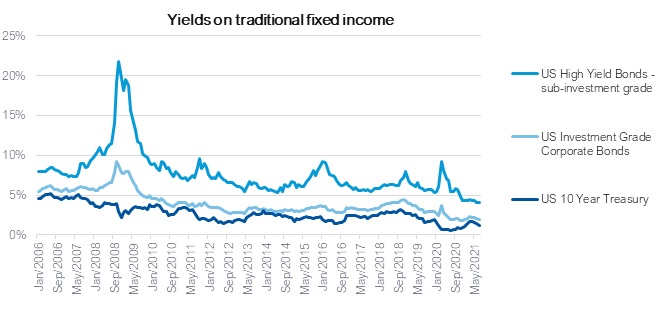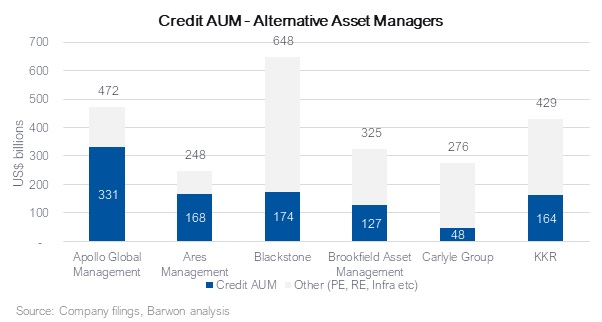How the chase for yield is benefitting alternative asset managers in a BIG way
With interest rates at historical lows and looking to stay that way for the foreseeable future, we are seeing many investors looking at alternative asset managers (AAMs) as a source for higher income.
AAMs have had a strong performance this calendar year to date and whilst valuation multiples have clearly expanded, we believe the share price appreciation is supported by robust fundamentals, solid investment performance through the pandemic, and perhaps more importantly – an expanding total addressable market (TAM). One of the biggest areas of growth for a number of the large established AAMs has been partnerships with insurance companies. And specifically, in the area of annuities. In this article we will discuss what has triggered the growth in AAMs and why they are partnering with insurance companies.
The demand for yield
Annuities are big business. Essentially annuities are investment products for retirement that help individuals convert their lump sum into an annual income stream. In the US there is an estimated US$2.5 trillion in retirement assets invested in annuities products, which is fundamentally a ‘spread’ business. The holder of an annuity, typically a retiree, pays a lump sum upfront in exchange for a promise of a set return, for example 3% for the next 10 years. The seller of the annuity, the insurance company, invests that lump sum and seeks to earn a return on that premium over and above the promised future payout to the policyholder.
The below chart is a review of yields on
traditional fixed income securities. Reviewing US Treasuries we have seen a
massive decline in yields over the past 15 years. Today, 10-year US treasuries
are yielding just over 1% compared to 5% in 2006. In 2021, even the majority of
US Investment Grade Corporate Bonds have a yield to maturity of less than 1.5%.
US sub-investment Grade High Yield Bonds are yielding under 4%, which is well
below the required rate of return for most institutional investors.

Source: Federal
Reserve Bank of St Louis, Bloomberg
The dramatic decline in global interest rates, along with stifling regulation, has meant that many of these blocks of annuities have become uneconomic for insurance companies. The pressure on insurance companies, and indeed many other institutional investors including pension funds and endowments, to seek higher yield has been increasing in urgency and magnitude. This has led to AAMs looking to partner with insurance companies allowing them to combine permanent capital and private capital.
Private credit – offering spread
Private credit is the spectrum of investments that exist outside traditional fixed income markets. The unifying theme however is filling gaps created by market inefficiencies through origination. Self-originated loans allow a lender to conduct their own due diligence, negotiate structure and economics. The large established AAMs, with scaled platforms across private credit, infrastructure, real estate and renewable energy are ideally positioned to originate debt investments for insurers.
Examples of this include: corporate direct lending, asset backed financing, aircraft leasing, life science loans, royalty financing, residential and commercial property mortgages. In these self-originated transactions, advantages of existing relationships, flexibility of capital, and informational benefits can all contribute to an excess return of 100-300bps for comparable credit risk.
As such we are seeing many insurance companies, along with many other institutional investors, begin to increase their allocation to the private credit asset class. In order to also gain a slice of this massive opportunity, AAMs have also scrambled to acquire and partner with these large capital allocators.
Alternative asset managers – transactions in the insurance sector
Apollo Global Management established its own insurance company called Athene in 2009 in the wake of the global financial crisis with the objective to scour insurance company balance sheets for retirement annuities to buy cheaply. Many insurers were desperate to offload books of annuities, sold with promises of returns made in a much higher rate environment, that were dragging down their financial results.
Over the next decade, Athene completed major transactions with Aviva, Voya and Prudential. Earlier this year, Athene took a minority stake in Challenger, by far the largest provider of annuity products in the Australian market. For Apollo, this initiative has been transformational to their business. Athene, together with its European counterpart Athora, now manage over $255bn in assets. Despite its size, Athene/Athora is expected to be the single biggest contributor to Apollo’s growth over the next five years.
Insurance companies continue to face similar challenges in the current prolonged ultra-low rate environment. As mentioned earlier, insurance is a ‘spread’ business. Holders of Athene annuities, for example, are promised a set return — say 3 or 4% annually — and it is up to the insurer to invest profitably enough to meet that liability. If they can meet promised returns, the insurer can keep the excess. Athene is levered enough that its returns on equity can top 20%.
Some AAMs such as Blackstone and Brookfield have preferred to take minority stakes in insurers and engage as the investment manager of large insurance portfolios. Others such as Ares Management, KKR, and Apollo have elected for outright ownership of insurance companies effectively creating captive AUM. Under both models, the insurance portfolios gain preferential access to the manager’s private credit and alternative strategies, and the AAM has won a stable, large, and growing client.
Expanding Total Addressable Market
Historically, institutional clients would turn to the likes of Blackstone, Apollo or KKR for a single strategy - private equity. PE only played a small role (<10%) in overall portfolios with the remainder comprised of traditional equities and bonds. Today, institutional investors are invested across multiple strategies of a single manager and reducing the number of different manager relationships.
Bruce Flatt, CEO of Brookfield, has commented that insurance could become a “$100 billion to $200 billion business” for Brookfield over time.
KKR, with its recent acquisition of Global Atlantic, boosted its assets managed on behalf of insurance companies from $30bn to $100bn overnight. Blackstone was recently appointed exclusive external manager of an initial $50bn of assets by AIG’s life and retirement business. The pool is to grow to $92.5bn over the next six years and will add $400M in revenue per annum. Even for a manager of Blackstone’s scale, this is material relative to their 2020 fee revenue of $4.5bn. The chart below shows that credit strategies are now a material sleeve of group platforms.

According to Preqin, the average allocation to private credit for insurance companies is 1-2%, well below the target allocation of 3-4%. With interest rates likely to remain near historic lows for some time, we believe the shift in portfolio allocation away from plain vanilla corporate and government bonds to higher yielding private credit strategies will continue to gain momentum.
Barwon has been managing the Barwon Global Listed Private Equity Fund since 2007 with the Fund allocating to Alternative Asset Managers including Apollo Global Management, Blackstone, KKR and Ares Management. The Barwon Global Listed Private Equity Fund has returned 15% p.a. over the past 10 years.
4 topics
1 stock mentioned

